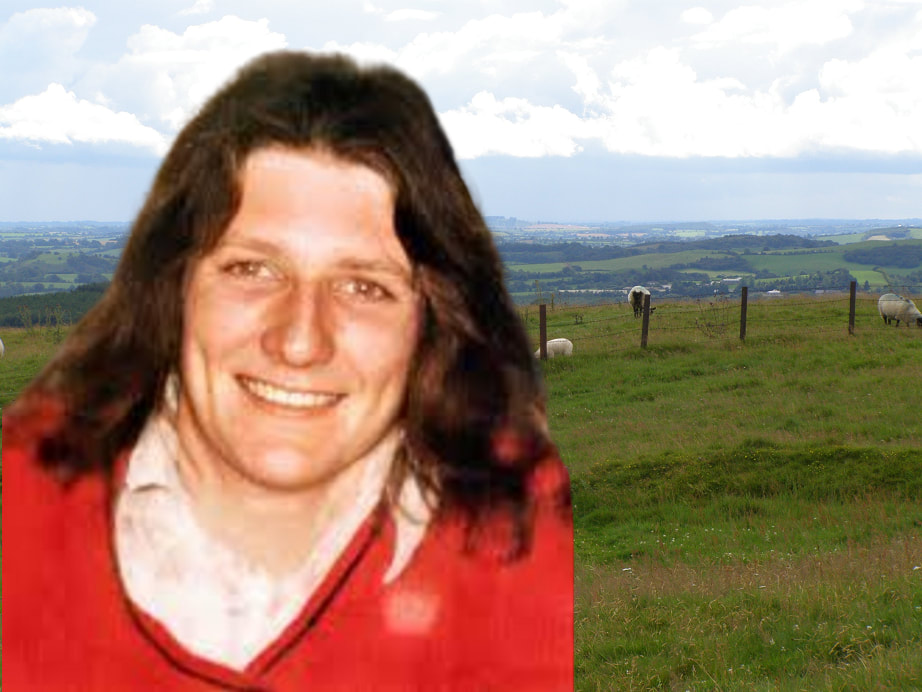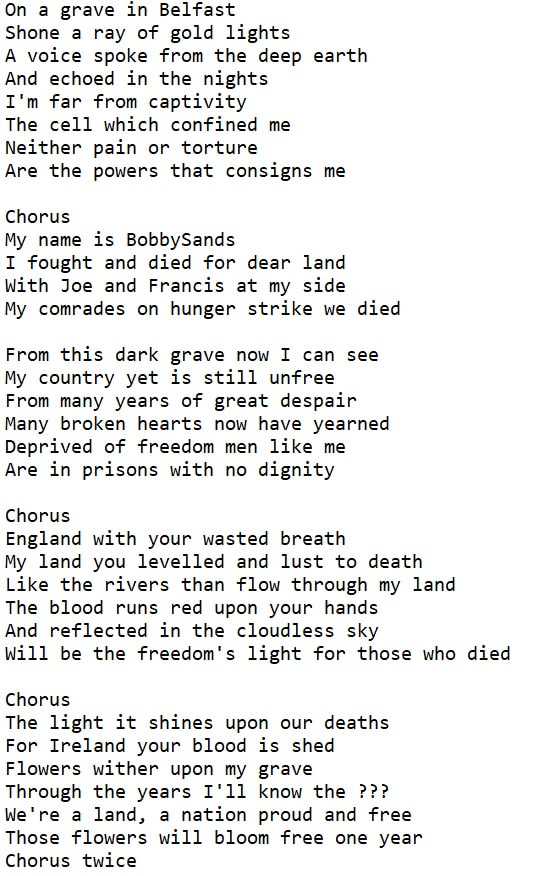Bobby Sands Song Lyrics And Guitar Chords
Unknown songwriter. Chords by Marc. Recorded by Claymore. The name ''Joe'' in the lyrics refers to Joe McDonnell and Francis refers to Francis Hughes, both of these men also died on hunger strike in 1981 along with Bobby. Other ballads written about Bobby Sands here include Bobby Sands From Belfast by The Irish Brigade .
Intor: D-Em-F#m-Em D-Em-F#m-Em D-D
(D)On a grave in (Em)Belfast -Em-A
Shone a ray of (D)gold lights
A (D)voice spoke from the (Em)deep earth -Em-A
And echoed (D)in the nights
I’m (D)far from cap(Em)tivity -Em-A
The cell which con(D)fined me
(D)Neither pain or (Em)torture -Em-A
Are the powers that con(D)signs me
Chorus
My (A)name is Bobby(D)Sands
I (A)fought and (A7)died for dear (D)land
With (A)Joe and Francis (D)at my side
My (A)comrades on (A7)hunger strike we (D)died
From (D)this dark grave now (Em)I can see -Em-A
My country yet is (D)still unfree
From (D)many years of (Em)great despair -Em-A
Many broken hearts (D)now have yearned
De(D)prived of freedom (Em)men like me -Em-A
Are in prisons with no (D)dignity
Chorus
(D)England with your (Em)wasted breath -Em-A
My land you levelled and (D)lust to death
Like the (D)rivers than flow (Em)through my land -Em-A
The blood runs red u(D)pon your hands
And re(D)flected in the (Em)cloudless sky -Em-A
Will be the freedom’s light for (D)those who died
Chorus
The (D)light it shines u(Em)pon our deaths -Em-A
For Ireland your (D)blood is shed
(D)Flowers wither u(Em)pon my grave -Em-A
Through the years I’ll (D)know the ???
We’re a (D)land, a nation (Em)proud and free -Em-A
Those flowers will bloom (D)free one year
Chorus twice
Repeat Intro
Other songs on the site about Bobby Sands include
Bobby Sands From Belfast
(D)On a grave in (Em)Belfast -Em-A
Shone a ray of (D)gold lights
A (D)voice spoke from the (Em)deep earth -Em-A
And echoed (D)in the nights
I’m (D)far from cap(Em)tivity -Em-A
The cell which con(D)fined me
(D)Neither pain or (Em)torture -Em-A
Are the powers that con(D)signs me
Chorus
My (A)name is Bobby(D)Sands
I (A)fought and (A7)died for dear (D)land
With (A)Joe and Francis (D)at my side
My (A)comrades on (A7)hunger strike we (D)died
From (D)this dark grave now (Em)I can see -Em-A
My country yet is (D)still unfree
From (D)many years of (Em)great despair -Em-A
Many broken hearts (D)now have yearned
De(D)prived of freedom (Em)men like me -Em-A
Are in prisons with no (D)dignity
Chorus
(D)England with your (Em)wasted breath -Em-A
My land you levelled and (D)lust to death
Like the (D)rivers than flow (Em)through my land -Em-A
The blood runs red u(D)pon your hands
And re(D)flected in the (Em)cloudless sky -Em-A
Will be the freedom’s light for (D)those who died
Chorus
The (D)light it shines u(Em)pon our deaths -Em-A
For Ireland your (D)blood is shed
(D)Flowers wither u(Em)pon my grave -Em-A
Through the years I’ll (D)know the ???
We’re a (D)land, a nation (Em)proud and free -Em-A
Those flowers will bloom (D)free one year
Chorus twice
Repeat Intro
Other songs on the site about Bobby Sands include
Bobby Sands From Belfast
and the Hunger Strike
Bobby Sands is a name that has become synonymous with the Irish republican movement and the concept of a hunger strike as a form of political protest. His name evokes a sense of heroism and sacrifice, but also controversy and debate. Sands' decision to embark on a hunger strike in 1981, ultimately leading to his death, captured the attention of the world and sparked a renewed interest in the conflict in Northern Ireland. This thesis will explore the life and actions of Bobby Sands, the circumstances that led to his hunger strike, and its impact on the wider political landscape.
Born in Belfast, Northern Ireland in 1954, Robert Gerard Sands grew up in a working-class Catholic family and was exposed to the violence and turmoil of the Troubles at an early age. At the age of 18, Sands joined the Provisional Irish Republican Army (IRA) and became involved in a series of bombings and shootings targeting British soldiers and government establishments. In 1977, he was arrested and sentenced to 14 years in prison for possession of firearms. It was during his time in prison that Sands' political beliefs and dedication to the republican cause were solidified.
In 1981, Sands and other republican prisoners embarked on a hunger strike in response to the British government's decision to revoke their status as political prisoners. This meant that they would be treated as common criminals, denying them certain rights and privileges, such as the right to wear their own clothes and have visits from family and friends. Sands, as the leader of the strike, was determined to bring attention to the inhumane conditions in which the prisoners were being held and to demand recognition of their political status.
The hunger strike was a calculated and strategic move by the IRA and the republican movement. It was a form of non-violent protest that could garner international sympathy and support, unlike the violent tactics of the past. The strike quickly gained momentum and received widespread media coverage, with Sands' articulate and passionate writings from prison capturing the attention of the world. As his health deteriorated, the British government remained steadfast in their refusal to grant political status, and Sands' death on the 66th day of his hunger strike sparked a wave of protests and violence in Northern Ireland and beyond.
The death of Bobby Sands had a profound impact on the conflict in Northern Ireland. It served as a rallying cry for the republican movement and reignited the struggle for a united Ireland. The international attention and sympathy garnered by the hunger strike put pressure on the British government to address the issue of political status and ultimately led to a compromise with the prisoners. The events of 1981 also had a significant impact on the political landscape in Ireland, with the republican movement gaining more support and the British government being forced to reassess their approach to the conflict.
However, the hunger strike and Bobby Sands' actions remain controversial and are still the subject of debate. Some argue that the strike was a necessary and justified means of protest against the oppressive British rule, while others view it as a reckless and futile act that caused unnecessary suffering and death. The actions of the British government and their treatment of the prisoners are also subject to scrutiny and criticism, with many viewing the hunger strike as a failure of the government to address the underlying issues of the conflict.
In conclusion, Bobby Sands and his decision to embark on a hunger strike in 1981 have had a lasting impact on the conflict in Northern Ireland and the wider political landscape. His sacrifice and determination to fight for the republican cause have made him a symbol of resistance and have brought attention to the ongoing struggle for a united Ireland. The hunger strike and its aftermath continue to be a topic of discussion and reflection, highlighting the complexities and consequences of political activism and the quest for justice.
Bobby Sands is a name that has become synonymous with the Irish republican movement and the concept of a hunger strike as a form of political protest. His name evokes a sense of heroism and sacrifice, but also controversy and debate. Sands' decision to embark on a hunger strike in 1981, ultimately leading to his death, captured the attention of the world and sparked a renewed interest in the conflict in Northern Ireland. This thesis will explore the life and actions of Bobby Sands, the circumstances that led to his hunger strike, and its impact on the wider political landscape.
Born in Belfast, Northern Ireland in 1954, Robert Gerard Sands grew up in a working-class Catholic family and was exposed to the violence and turmoil of the Troubles at an early age. At the age of 18, Sands joined the Provisional Irish Republican Army (IRA) and became involved in a series of bombings and shootings targeting British soldiers and government establishments. In 1977, he was arrested and sentenced to 14 years in prison for possession of firearms. It was during his time in prison that Sands' political beliefs and dedication to the republican cause were solidified.
In 1981, Sands and other republican prisoners embarked on a hunger strike in response to the British government's decision to revoke their status as political prisoners. This meant that they would be treated as common criminals, denying them certain rights and privileges, such as the right to wear their own clothes and have visits from family and friends. Sands, as the leader of the strike, was determined to bring attention to the inhumane conditions in which the prisoners were being held and to demand recognition of their political status.
The hunger strike was a calculated and strategic move by the IRA and the republican movement. It was a form of non-violent protest that could garner international sympathy and support, unlike the violent tactics of the past. The strike quickly gained momentum and received widespread media coverage, with Sands' articulate and passionate writings from prison capturing the attention of the world. As his health deteriorated, the British government remained steadfast in their refusal to grant political status, and Sands' death on the 66th day of his hunger strike sparked a wave of protests and violence in Northern Ireland and beyond.
The death of Bobby Sands had a profound impact on the conflict in Northern Ireland. It served as a rallying cry for the republican movement and reignited the struggle for a united Ireland. The international attention and sympathy garnered by the hunger strike put pressure on the British government to address the issue of political status and ultimately led to a compromise with the prisoners. The events of 1981 also had a significant impact on the political landscape in Ireland, with the republican movement gaining more support and the British government being forced to reassess their approach to the conflict.
However, the hunger strike and Bobby Sands' actions remain controversial and are still the subject of debate. Some argue that the strike was a necessary and justified means of protest against the oppressive British rule, while others view it as a reckless and futile act that caused unnecessary suffering and death. The actions of the British government and their treatment of the prisoners are also subject to scrutiny and criticism, with many viewing the hunger strike as a failure of the government to address the underlying issues of the conflict.
In conclusion, Bobby Sands and his decision to embark on a hunger strike in 1981 have had a lasting impact on the conflict in Northern Ireland and the wider political landscape. His sacrifice and determination to fight for the republican cause have made him a symbol of resistance and have brought attention to the ongoing struggle for a united Ireland. The hunger strike and its aftermath continue to be a topic of discussion and reflection, highlighting the complexities and consequences of political activism and the quest for justice.



